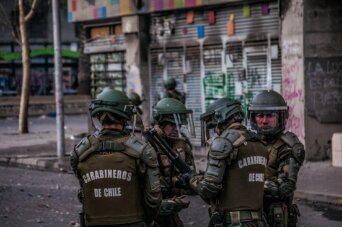- About
- Topics
- Picks
- Audio
- Story
- In-Depth
- Opinion
- News
- Donate
- Signup for our newsletterOur Editors' Best Picks.Send
Read, Debate: Engage.
| topic: | Human Rights |
|---|---|
| located: | Brazil, Mexico, Colombia, Ecuador, Venezuela, Argentina, Cuba, Bolivia |
| editor: | Ellen Nemitz |
On 13 January, Human Rights Watch released its annual report, which highlights the main issues regarding human rights in nearly 100 countries, 15 of which from Latin America. As for these Latin American nations, Human Rights Watch calls attention to an "alarming reversal of basic freedoms."
The dismantling of democracies was one the main topics raised by Tamara Taraciuk, the Americas director for Human Rights Watch, during a live-streamed talk held on Twitter Space. While she mentioned Cuba, Nicaragua and Venezuela, for instance, as actual dictatorships, other places are a cause for concern because their democratically elected leaders are undermining the institutions which sustain democracy, such as Brazil and Mexico.
These impressions regarding Brazil, in particular, are important to keep in mind since the country is preparing for its presidential election in October 2022. Even though the electoral process in the country is modern and safe - relying on traceable and quick-checking voting machines - the current president Jair Bolsonaro has more than once contested its already proven reliability and threatened not to accept an eventual defeat.
Besides democracy, other issues seem to be shared by several countries in the region. The failure to guarantee indigenous rights and environmental protection, for instance, is a gap common to Argentina, Bolivia, Brazil, Chile, Colombia and Ecuador. Similarly, the attacks on freedom of expression and independent media need to be addressed in many of the analysed countries, especially in Central America. In addition, the rights and safety of women and girls, LGBTQ+ communities, people with disabilities and other vulnerable cohorts are not guaranteed in many places, leaving these populations to face violence and economic inequalities.
Other problems include the COVID-19 pandemic and its numerous consequences (such as in education and poverty rates), the police repression of popular demonstrations, and the unequal distribution of vaccines: Chile boasts one of the best global rates of vaccination - more than 87 percent of people are fully vaccinated, while Haiti, the vaccination rate is less than 1 percent.
On the other hand, a handful of countries have achieved human rights advances - although they are not immune to implementation problems. This is the case for Argentina, which in 2021 permitted abortion at up to 14 weeks of pregnancy, recognised non-binary genders and displayed robust gender policies. Colombia, in its turn, has been pointed by Human Rights Watch as a good example of dealing with a migration wave, especially from its neighbour Venezuela, since it granted a 10-year legal status to Venezuelans who legally entered the country before June 2023. Ecuador has also carried out welcoming policies to Venezuelans, despite the remaining barriers to documentation and access to health services.
Taraciuk reminded viewers that journalists, activists and the justice system were crucial to hindering the progress of human rights violations, and warned that continued support for these groups in 2022 is essential - especially in a context where being a defender of human rights or the environment can cost one's life. In order to do so, it is necessary, now more than ever, to speak out about these several long-lasting crises - not rarely underreported - and demand from proper institutions and authorities to actually act towards a more fair Latin America in 2022.
Photo by Juan Manuel Núñez Méndez

